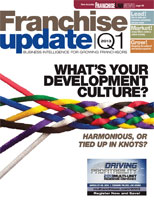What's Your Development Culture?: It's in the DNA at PostNet International
PostNet International Franchise Corp., which turns 20 this year, entered franchising with a development culture firmly in place. "We started as an independent consulting firm back in the '80s," says CEO and founder Steve Greenbaum, so a strong development culture was critical to its growth and success.
"When the business is dependent on growth, you learn very quickly," he says. "Ten years later, when we began franchising, we already had a very effective method of growth and knew how important it was to the culture of the business."
For Greenbaum, having a "development culture" means an organization supports, encourages, and embraces the idea that growth fuels the company and creates positive momentum. "Fundamentally, the idea is aligned with how important development is to the organization. Bringing in new people, ideas, and perspectives creates new opportunities to grow the business and revenue."
When franchise development and system growth are part of a company's DNA, he says, everyone understands that they play an important role in the company's success--from administrative positions through operations. That includes executives and other team members at headquarters, franchisees in the field, and even outside suppliers. "They see that the brand supports growth, which creates enthusiasm around the brand," says Greenbaum.
One difference today from his consulting company in the 1980s is that, as a franchisor, the company has two revenue streams: 1) adding new franchisees, and 2) increasing revenue and improving the profitability of every franchisee in the system. "Every franchise organization has that responsibility," he says.
"Some franchise organizations are focused on ensuring that profitability is not only achievable, but a critical, viable part of the company," says Greenbaum. "Growth should be the same, and franchisee growth is right up there. It becomes cultural, not aspirational, in the same way you'd support inclusion and profitability."
Everyone is important
One way PostNet creates buy-in to its development culture is by involving the corporate team beyond their departments, or "silos." For example, at discovery days, candidates not only spend time with the heads of different functional areas, they also meet every other support team member at headquarters.
"At the end of discovery day, everyone from the company welcomes the new franchisee into the system. Even if you're an administrative support person behind the scenes, you're a part of the team," says Greenbaum. One result: each person on the team feels valued for what they do for the organization.
"We're talking about culture, which lives within the organization. We're saying team members are important and valued as a member of the PostNet franchise family," he says. "It's as important for your organization and your organization's culture as it is for the new franchisee coming in."
Corporate employees and franchisees alike must understand "why growth is so important to us, why it's culturally ingrained in everything we do," says Greenbaum. "Great franchise companies are committed to franchisee inclusion. We know and understand that, and we want to provide opportunities for franchisees to have a voice, to be heard."
Internally, everyone must understand how important their role is in the organization and its culture. "It doesn't matter if they play a secondary role--it's important," he says. And it inspires the rest of the organization. "When franchisees see or experience growth and see people investing in the business and the brand, it creates a tremendous momentum."
That momentum, says Greenbaum is contagious. "People are investing in a franchise because they expect you to build the brand. 'Growth happens,' and when it does, it inspires people to see that's why they invested in the brand. Nobody buys a franchise unless they believe the organization will grow."
Making a development culture happen starts with communicating to everyone why development is important to the system. "It's not just about collecting another franchise fee or adding royalty revenue; it's also about bringing fresh ideas and innovation into the organization," says Greenbaum. New franchisees bring new ways of thinking that can constructively challenge how a brand has been doing things, resulting in improvements system-wide.
Awareness vs. integration
In creating a development culture, there's a delicate balance between the benefits of breaking down interdepartmental silos and maintaining individual and departmental responsibility and accountability.
At PostNet, says Greenbaum, "Franchise sales and anything related to growing the business and the brand does not interact with franchise unit economics and profitability in the organization. We have separate management teams for that."
"We are setting the vision for growth and profitability at the senior manager and department head levels. Then those ideas, plans, and objectives are filtered down through the organization," he says. However, he adds, although there is separate responsibility for each department's activities, "information and accountability flows at all levels." This way, everyone is aware of what other departments are doing, but they are not responsible for those activities.
"Awareness and integration are two different things," he says. "We own our projects and initiatives in our particular discipline, but all other departments benefit from the upward and downward flow of information." Says Greenbaum, "Everyone plays some role, but not everyone is responsible."
So yes to "silos" in terms of ownership and accountability, but not with information and communication, which must be very open and fluid, he says--and also encourages feedback between the various departments and disciplines. For example, "Our director of franchise development is not responsible for how long the real estate process is taking, so they're aware but not responsible." This builds alignment, enabling all the separate disciplines to row in the same direction.
One more important component to keeping the organization sailing along harmoniously, says Greenbaum. "Accountability is critical."
Change vs. innovation
Today PostNet has more than 700 locations worldwide. Before the recession hit in 2008, the company was adding 35 to 50 new franchisees a year. But from 2008 to 2012, yearly growth slowed to single digits. Greenbaum says many factors were involved: the shift to digital in the mid-2000s, the company's business model, relocating from Las Vegas to Denver, and of course the economy and tight credit. All of this forced the company to take a hard look in the mirror.
"We had to change the business model," he says. "We had to blow up every idea we thought was good, dismiss a lot of what we thought, and focus on learning." One important lesson from this experience: learning the difference between change and innovation. "Innovation is improving what you've been doing, compared with doing something completely different. We innovated for a long time, but we didn't change." It took a perfect storm to shake things up enough to move from innovating to changing in a way that would re-establish growth and improve unit economics.
After some tough soul-searching, the company has turned things around, shifting from a pack-and-ship store to a "Neighborhood Business Center" that works with small businesses, instead of individual consumers, to provide a set of services that help those small businesses grow. "We've shifted our business model from transactional to long-term relationships and recurring revenue," he says. Another big shift: the new model draws heavily on outsourcing and developing partnerships with vendors, allowing franchisees to provide expanded services at lower cost.
"We're selling franchises again," says Greenbaum, who expects to see 24 to 36 new sales this year. The momentum is back.
Share this Feature
Recommended Reading:
FRANCHISE TOPICS
- Multi-Unit Franchising
- Get Started in Franchising
- Franchise Growth
- Franchise Operations
- Open New Units
- Franchise Leadership
- Franchise Marketing
- Technology
- Franchise Law
- Franchise Awards
- Franchise Rankings
- Franchise Trends
- Franchise Development
- Featured Franchise Stories
FEATURED IN

Franchise Update Magazine: Issue 1, 2013








 The franchise listed above are not related to or endorsed by Franchise Update or Franchise Update Media Group. We are not engaged in, supporting, or endorsing any specific franchise, business opportunity, company or individual. No statement in this site is to be construed as a recommendation. We encourage prospective franchise buyers to perform extensive due diligence when considering a franchise opportunity.
The franchise listed above are not related to or endorsed by Franchise Update or Franchise Update Media Group. We are not engaged in, supporting, or endorsing any specific franchise, business opportunity, company or individual. No statement in this site is to be construed as a recommendation. We encourage prospective franchise buyers to perform extensive due diligence when considering a franchise opportunity.